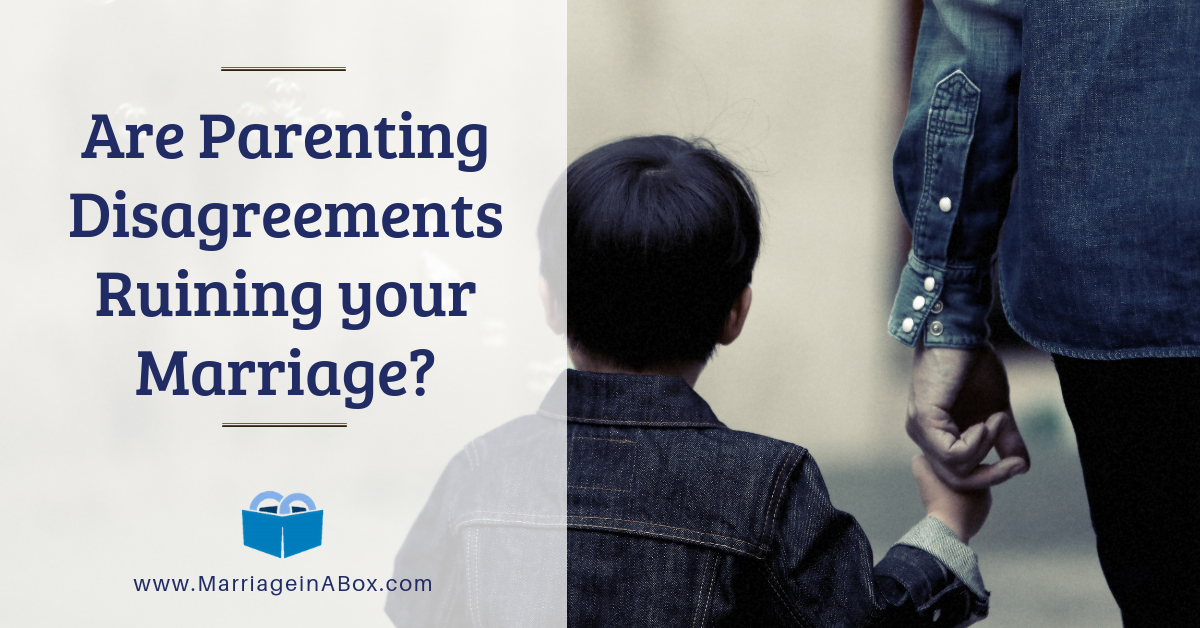parenting

It’s really easy to let your kids become the center of your family’s life. Too much focus on the kids can actually wear down a marriage. Happy parents make a home healthy and happy. Your marriage should be the center of your family. Make your relationship the anchor piece instead of the children being what it’s all about.
- Don’t get trapped in gender roles.
Mom doesn’t always have to pack the lunches for school. Dad doesn’t always have to walk the dog. Both of you can take turns or whoever is free can pack the lunches or walk the dog. Shared chores eliminate the stress of piling it all on one partner.
- Relinquish total control.
Sometimes Mom can control the parenting in the house. She sets the kids schedules, determines what they wear, what they eat, etc. Let your husband in on the parenting. Don’t worry about whether their clothes are perfect or that they always eat this or that for breakfast. Let dad make breakfast. Let Dad get the kids dressed too. You both made these children together so you should both parent then together. Shared parenting will bring you closer together.
- Do not assume.
Often one spouse will get angry with the other spouse for not automatically picking up the dirty clothes, sitting down and watching TV while the other does chores, etc. Your spouse may not know that you need help, so ASK. Would you mind cleaning up the dinner dishes while I pack the kids lunches? Don’t stew in silence doing all the work; that just builds resentment towards your spouse. Ask when you need help.
- Focus Less Attention on the Kids
Children are demanding. They want all of your time and attention. If you let them have all of the time and attention, there isn’t any left for your marriage. Set boundaries for your kids. “Please don’t interrupt when Mommy and Daddy are talking.” “ If you play on your own in your play area for 30 minutes, we can all go do something fun this afternoon.”
- Steal time from the Kids to Give to Your marriage.
After you have spent the day with the kids, and the evening with bath time, story time, bedtime, you are both ready for bed. Put the kids to bed early so you can spend some time together. Make arrangements with a neighbor that has kids to babysit for each other occasionally to get a night out. Take advantage of area daycares or churches that offer parent’s night outs and go have an intimate dinner together.

With all of the people, projects, tasks, chores, and roles to fill in our daily lives, things tend to naturally fall into their places on our lists unless we make conscious choices. Our choices reflect where our priorities lie. People are playing with fire when they put careers and kids first and don’t pay attention to their romantic partnerships.
Without a strong marriage and loving home, kids won’t thrive, so you’re doing them a disservice by putting your spouse on the back burner, which can lead to marital trouble and even divorce. Children’s needs shouldn’t be neglected, but devote time during the week to nourish your marriage relationship, too.
How can you make your marriage a priority?
- Make an Emotional Connection with your Spouse Daily
Send her a text telling her you can’t stop thinking about her. Let him know that your song came on the radio and you thought of him.
- Make Physical contact often.
Kiss, hug, hold hands, massage tired muscles etc. Physical touch is essential to keeping the romance alive.
- Seek Out Your Spouse’s Input.
Let your spouse know that you value his advice, opinion, and input on big and small decision and issues.
- Before you make plans, check-in with your spouse
You don’t need your spouse’s permission for what ever you do, but do them the courtesy of checking in to make sure there is not something else going on before you make plans.
- Pursue passion together.
Watch a football game together, tackle a DIY project, explore in nature, read books and hang out at a coffee shop, and more. Allow your passions to bring you closer, not apart.
- Always treat each other with courtesy, sensitivity, and respect.
When you treat each other the way you want to be treated, you each feel valued.
- Solve problems together.
Schedule a time for the two of you to sit down and talk about a problem. This is not a time to unload all of the baggage of the past, berate your partner etc. It is a time for you both to tackle ONE problem in a loving manner. Have an agenda, talk calmly, and make your point without attacking your spouse. Listen to their side or comments. Solve the problem.
- Communicate with your partner.
It is easy to fall into the routine communication pattern of “How was your day?”, “Here is what the kids did….”, “Things at the office…” Talk to each other like you did when you were dating. Voice your dreams, your joys, your fears, your frustrations, and your funny moments.
- Schedule time for intimacy.
Just like you schedule important things like doctor’s appointments, meetings, etc., you need to build in time for romance. Make a regular date night where you spend time together enjoying each other’s company. Be sure some of those date nights include sex.
- Plan an annual Get Away.
Every couple needs time away from the kids, their jobs, and their daily routines in order to re-connect. Build good memories, create a positive shared experience, and make each Get Away something you both look forward to.

When it comes to making life-changing decisions, parents feel immense pressure to get everything right. Major decisions like moving across the country can’t be taken lightly. Naturally, parents want to do all they can to ensure the decision to uproot their family or change the family dynamic will improve the lives of their children in addition to their own.
Sometimes, parents realize that a move across the country is necessary for their family’s financial status, health and well-being, or happiness. The challenges of orchestrating a large-scale move involve telling your kids about the move, finding the right school, and helping everyone settle into a new home and life. It’s enough to make any parents lose their minds, but our tips will help you keep your sanity.
- Keep Your Kids in the Loop
Kids of all ages deserve to know what is happening in their families, and keeping them in the loop while you plan to make a move is a must. By involving kids in discussions and helping them understand what to expect and when, you help them feel less scared and anxious about the changes that are about to happen to their lives.
Your kids may not be able to decide to move or not, but they can ask questions, share their concerns, and begin to accept the move when you involve them in discussions early in the process. Be clear and direct in your discussions with them, give them a timeline, and understand that they will need some time to process and accept the news that they are leaving their home, school, and friends.
The Art of Happy Moving shares some tips for telling your kids about a move across the country. They recommend telling them as soon as you can but waiting until you know specific details, so you don’t scare your kids with too much uncertainty. It’s also a good idea to plan where and how to tell your kids about moving; some families turn off the television and hold a distraction-free family meeting, while others tell their kids individually. The best approach is to explain why and when you are moving and then follow up with three reasons they should be excited about the move.
- Find the Right School for Your Kids Ahead of Time
Moving is a chaotic process, and the last thing you want to do is spend time visiting schools while you are packing and helping your children through the transition to a new area of the country. That’s why, as soon as you choose your destination, you should begin finding the right school for your children.
First, choose the type of school that best suits your child’s needs. It may be helpful to talk to his current teacher and get her recommendations; she may suggest a private school with smaller class sizes, a public school with a strong theater program, or a charter school with an emphasis on collaborative learning environments.
Then, research schools near your new home and make a list of those that best fit your child. Plan to visit the schools on your short list and to meet with teachers, principals, and counselors to learn more about their educational philosophy and teaching strategies. Finally, take your child to visit the new school before you move so he can see his classrooms, meet his teachers, and begin to meet new friends.
- Hire Help So You Can Focus on Your Family
One of the best ways to ensure a smooth move is to hire help. Professional moving companies have experience orchestrating moves and getting families across the country with all of their belongings in one piece. Moving companies also can save you time (and your sanity) by packing your furniture and appliances safely, loading your boxes, and driving your possessions across the country so you can spend more time focusing on your family and their needs.
Best of all, full-service moving companies will unload and unpack your items. By leaving the heavy lifting to the pros, you’ll have time to take your kids to visit local playgrounds and schools so they can start making new friends and getting acclimated to their new home more quickly.
You can move your family across the country and keep your sanity in tact if you keep your kids in the loop, find the right schools ahead of time, and hire help so you can focus on your family.

Marriage is tough to navigate as you try to figure our how to communicate best with your partner and enjoy life. Add in little ones that you have to work together to raise and it becomes very tricky to navigate. The way you treat each other and communicate about parenting can either have a positive or a negative effect on your relationship with each other.
Negative effects:
You do your children no good when you and your partner basically cancel each other out by picking opposing parenting styles. One parent sets a strict tone and the other one sneaks privileges to the child. The end result is stressed out spouses, a dysfunctional family, and children that receive mixed messages.
There is nothing worse than two parents arguing about parenting issues in front of their children. You are giving your child a clear message that no one is in charge. The end result will be children who play you and your partner against one another and that is a disaster for the kids and for your relationship.
Positive effects:
Be patient with each other, practice the same team mentality, and present a united front with the kids. The most important thing is to honor and respect each other and work out your solutions as a team.
Three ways to get a positive parenting effect.
- What are your must-haves?
Make a list of your must-haves for parenting and have your spouse make a list of his must-haves. Compare your list. A must-have list might look something like this:
-Kids must talk respectfully
-Kids must help out with house and yard chores
-Kids must complete homework before play
-Kids must have a regular bedtime
Compare your must-have list with your partner’s and see if you can compromise and agree to each other’s must-haves. Try to be open and flexible. Make a master list of must-haves that you will both agree to.
- Discipline Consistently
When children break the rules, you need to have consequences that have already been determined ahead of time. Some instances of breaking the rules may merit talking to the child about what they did wrong and what they should have done and putting the child in time out. Other instances may warrant a privilege being taken away, grounding, or a swat on the backside. Whatever type of discipline you both agree on, it should be decided before hand and handed out consistently for each type of infraction.
- Always back each other up.
Agree to back each other up when you are in front of the children. Whichever parent gave the first response to the request is the parent that leads that situation.
“Did you already ask Mommy about that? What did Mommy say?” (same goes for Daddy)
If you don’t agree with the way your spouse handled a particular parenting situation, wait until you are in private to discuss your concerns. Talk to each other calmly and respectfully. Focus on the specific instance, how you felt about it and what might have been a better way to handle it.
Couples, who make a habit out of talking everything through, create much more space for mutual compassion, respect, and a loving relationship. Your kids benefit as well, because they know you are both parenting as a team.

A study by the National Center for Family & Marriage Research reports that the divorce rate has decreased among adults under age 35. However, the divorce rate among adults over 35 has risen, particularly among adults over 55. The reason most stated for divorce among older adults is that they no longer have much in common and don’t love each other.
Wow! Older couples have usually been together a long time, raised children together and yet, many have fallen out of love. These couples have allowed their marriage to erode and they’ve become emotionally disconnected. How does that happen?
They spent all of their time and energy providing for and raising their children, but did not nurture their marriage. After years of neglect, when the children grew up and moved out on their own, husband and wife did not know what to do with them. They no longer knew each other, and found they no longer had romantic interest in each other.
This does not have to be your marriage. Couples who want kids and those who have kids can build a happy marriage that lasts a lifetime.
Rule #1: Your Marriage is Your No.1 Priority, not the Kids
Ask anyone who has a new baby in the house; caring for young children can consume ALL of your time, if you let it. There’s the feedings, the diaper changings, the intermittent sleep patterns. Even amidst all of that, you still need to make time for your spouse and your marriage.
Once the baby is a sleep, make a meal together and enjoy some adult conversation and catch up on your day. Share the baby duties so that one spouse is not worn out while the other is ready to go. Sneak in time for romance.
Rule #2: Bond Your Marriage with Communication.
As children grow older, life becomes more hectic and communication with your spouse can tend to focus on shopping lists, tasks to be done, coordinating schedules, discipline issues with the kids, etc. etc. that is not the type of communication that creates an intimate connection between you and your spouse. Family communication can often tend to be the kids interrupting your conversations to tell you something, ask you something, etc.
Remember when you were dating and spent hours discussing each other’s hopes, dreams, goals, and concerns? That was intimate communication. The difference is that the conversation focused on each of you, and you as a couple, not the kids, the chores, etc.
Connect with each other every day by setting aside some time to tune out distractions and talking to each other like you did when you were dating.
Rule #3: Don’t Bury the Issues
Every marriage hits a roadblock at some point. If the issue that is bothering you about your marriage or parenting is not addressed, it will fester like an open sore and do serious damage. “Don’t let the sun go down on your anger” is an old saying that actually proves true. Whatever the issue is, and no matter how uncomfortable you are, the sooner you talk it through with your spouse and come to a mutually agreed solution, the better.
Schedule time to talk with your spouse out of earshot of the little ones. Set the mood by calming stating what is bothering you. I feel this …..when you…… Listen to your spouse’s response. Discuss and focus on solutions, not blame.
Rule #4: Treat each other with Appreciation and Love.
Remember to acknowledge each other’s efforts. "Honey, that dinner was delicious." "Dear, thank you for fixing the leak in the faucet." Hold hands, cuddle and give each other a kiss often. Everyone wants to feel that spark of romance, even years after your first date. Keep that spark alive with small, every day bits of appreciation and love.
A healthy, long-term marriage means working together as a team, loving each other, loving your children and planning for life together after the children are gone.

We have all seen the family at the restaurant arguing about what to order, or at the store with kids crying because they did not get what they asked for. Envision a vacation where every day consists of those types of episodes and you have two spouses ready to call it quits. Vacationing with the kids does not have to be that way. It can actually be a wonderful experience with a little advance planning.
You need to have a plan in place before you leave home for the vacation. Without a plan, arguments about what to eat, where to stay, what to do, and how to handle extra perks, will ruin the family fun and end up costing you a bundle. Planning a summer vacation with the kids is a lot of work. It is best tackled together.
Where to Go and Stay: Theme park vacations such as Disneyland, Disneyworld or Universal Studios can be very expensive if you stay at the resort. If you are looking for a theme park vacation, perhaps a theme park that is less well known may offer better deals. Another way to save money is to stay in a hotel or motel or rented condo outside the theme park and just pay for day passes to the theme park.
If the kids are older, make sure that you and your spouse have a separate but adjacent room from the kids. It’s your vacation too and you will want to be able to have your own time together to unwind and enjoy each other’s company.
Consider a stay at a National Park. Many have rooms in a lodge or cabins for rent at reasonable rates. If you stay in the park, you may be able to get discounts on the park passes.
Meals: Anytime you eat a meal in a theme park or a restaurant in a major attraction, it costs much more than you would pay at a restaurant outside of the attraction. Determine in advance how many meals you plan to eat in the park-perhaps lunch and dinner or just lunch. Eat simple, inexpensive breakfasts in your hotel or motel and pack some snacks for the park, that way you will just pay for drinks and one or two meals. Some attractions may allow you to bring in your own water bottles, so check the policies in advance.
Activities: Many theme park complexes have 3 or 4 different theme parks in the park that each require separate admission passes. Will you go to all the parks or just 1 or 2? If you are at a national park, will you do a guided tour or get a map and go it on your own?
Be sure to sneak in some one-on-one time together. While the kids ride a ride, you can snuggle and hold hands on the bench while waiting for the kids. Have a quick romantic interlude while the kids take an afternoon nap before heading to an evening activity.
Extra Perks: Every vacation comes with its share of souvenirs, ice cream stops, photo sessions, or special activities like a burrow ride down the Grand Canyon or zip line tour or swimming with the dolphins at Sea World. Decide with your spouse on how much money to budget for those extras and stick to your budget. You want to capture memories with your spouse and kids, but you don’t want to break the bank doing it.
If you plan wisely and make time for each other, your vacation time with family can actually strengthen your marriage as well.

You know hobbies can help you relieve stress, but did you know hobbies can be beneficial for your kids as well? In addition to calming anxiety, hobbies can teach children important lessons when it comes to communication, creativity, and self-esteem. They can even spark an interest in a future career. However, fitting hobbies into the family budget isn’t always easy. Keep reading for some hobbies that have the most benefits for your children and ideas on getting started without wiping out all of your savings in the process.
Craft Some Science Experiments
The future of the world depends on science, technology, engineering, and math. This means your child’s career future may well depend on them developing an interest in one of these STEM subjects. Children who choose a STEM career may develop the next medical breakthrough or even be part of the first manned mission to reach Mars. Begin the interest in STEM at home by encouraging your children to practice some educational experiments in their spare time, such as making magic milk. To further encourage your little Einsteins, check online retailers to score STEM gear, like microscopes and building supplies, and save money. You can get cash back for shopping online with retailers like Walmart, to get everything for your kids’ experiments.
Create Works of Arts
Art can be another majorly beneficial hobby for kids to get into. Creating art aids in the development of problem-solving and social skills for young children. Just be sure to allow your little artists to express themselves freely. Painting and drawing can get fairly messy, so think about setting up a dedicated art room for your little ones. If you need to pick up art supplies, look online for starter kits filled with everything you need to get your kids started with painting or sculpting. Buying everything separately can add up, and these kits can cut costs. Amazon is a great place to find art kits to add to your hobby room. Look for cashback opportunities for Amazon or online coupons for stores like Michaels when you shop for art supplies.
Learn a Musical Instrument
For kids who are developing language and reading skills, learning an instrument can have some pretty major benefits. Studies show that picking up a new instrument impacts the brain’s ability to recall information and helps develop communication skills, among other mental and physical health benefits. Music can even help students develop better skills with math and boost their concentration in school. If you want your kids to give music a shot, it’s important to find an instrument they will love to play. Try out a few different options at local music stores before you settle on a final choice. For younger children, you can pick up inexpensive kid guitars, drums and keyboards to get them started. Once your child is older, you can rent instruments to use in lessons and school bands, as opposed to spending a lot of money to purchase one.
Pick Up Some Cooking Skills
When you think of hobbies for kids, you may not think of cooking. But baking and cooking are essential skills for children to learn, and there are many reasons to teach them how. Aside from learning how to properly prepare healthy meals, following recipes teaches kids reading skills, comprehension, and even math. Baking is based in science, with exact measurements and reactions between ingredients, while exploring different cuisines helps children learn about other cultures. If you decide to let your kids take up cooking as a hobby, be sure to teach them all about kitchen and food safety. Try searching online retailers for the supplies you need to keep your little chefs safe and having fun. Target has a ton of inexpensive kitchen supplies to fit your needs, and you can use rebates and coupons to save yourself some money.
Helping your kids benefit from productive hobbies doesn’t have to break the bank. You can find budget-friendly supplies by shopping with your favorite retailers online, and stock up on serious savings in the process. Let your kids explore their passions without sacrificing your budget!
Photo Credit: Unsplash

In-laws usually want to be helpful to their children when parenting their own children. While many times their advice is valuable, often times well meaning mother-in-laws can put a lot of stress on a marriage with their advice or scrutiny about your parenting style.
“You know it is not good to let the baby have a pacifier too often.”
“He really needs to start eating table food about now.”
“We never gave our children choices. We told them what they needed to do and they did it.”
While you want to have a good relationship with your mother-in-law, you and your husband also want the freedom to bring up and discipline your children according to your beliefs and values, not your mother-in-laws.
Here are a few strategies to gracefully deal with in-laws when they interfere in your parenting style.
- Don’t take it personally. As hard as this may be, remember that her constant advice giving says more about her than it does about you. What’s fueling her behavior is a strong need to give advice, which has nothing at all to do with whether or not you actually need it!
- Change the subject. When your mother-in-law brings something up, just laugh and then change the subject.
- Turn the tables. Ask her if the advice she just shared is what she did with your husband when he was a child. Draw her into a discussion about what she did as a parent. This shifts the focus away from you and your parenting. Then, when you’ve finished discussing her parenting stories, just change the subject. She’ll feel great because she will feel heard and you’ll feel great because you won’t have to listen to any more of her advice!
- Go silent. When your mother-in-law makes a comment, stop what you’re doing and then look at her without saying anything. Let the silence linger for a few minutes, and then change the subject.
- Stand together. You and your husband can approach his mother together and let her know that although you appreciate her insights and suggestions, the two of you have determined what parenting style works best for the both of you.
You need to talk to your spouse about your feelings first. They are the reason that you have a relationship with your in-laws and strategizing and discussing ways of coping with that relationship can prove to be useful in two ways. Firstly, it will provide some insight into the best ways to handle your in-laws. Secondly, and most importantly, it will help in separating your own relationship with your spouse from the one you have with your in laws.
It's important that you and your spouse are in agreement about how you parent your kids. You both need to let your in-laws know that you appreciate their care and concern, but you might have a different way of doing things and the decisions regarding parenting your children are yours to make.
‹ Newer Posts








